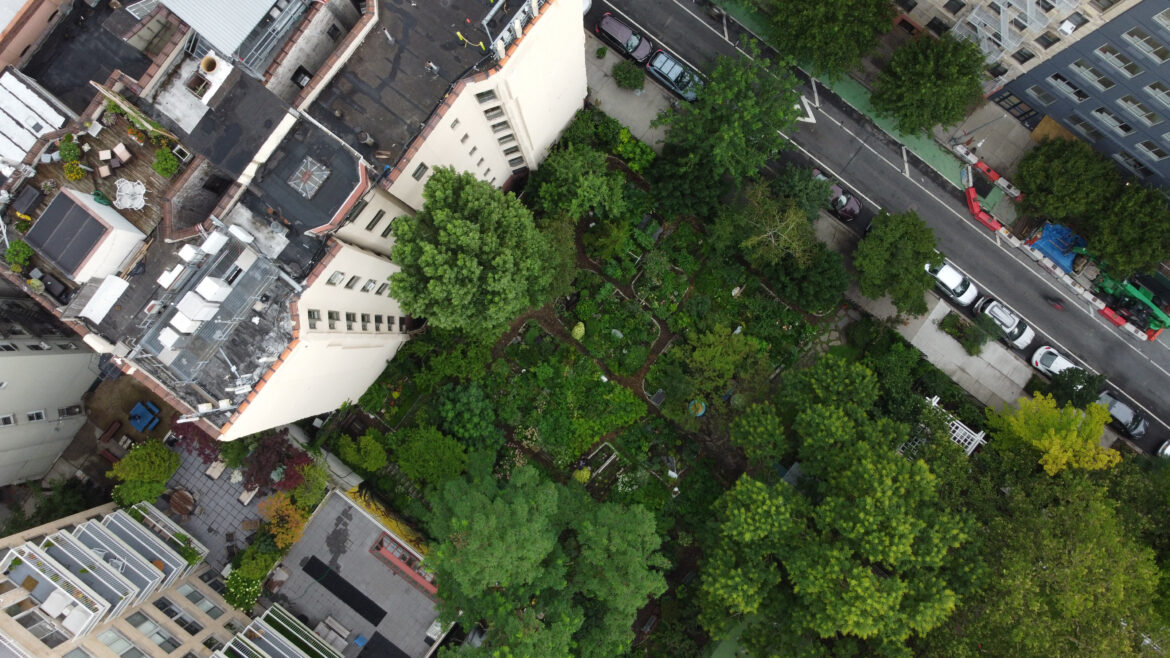Climate Week NYC is back and will run from September 21–28 with a whole host of events related to everything from policy to activism and even entrepreneurship. Many of the programs are accessible to the public and even available online.
Climate Week NYC started in 2009 to coincide with the meeting of the United Nations General Assembly. Since then, the campaign has become a leader in sharing the latest, most innovative research about the climate and its politics. Although we at the Food Policy Center are focused on nutrition and agriculture’s impact on the climate emergency, it is important to note that there are a number of opportunities to learn more about tech, energy, artificial intelligence, and business as well. This year, Climate Week NYC has partnered with Tilt Collective for its food-related programming. Together, they are focused on greenhouse gas emissions, of which Climate Week’s website claims the food industry produces 21–37 percent of today. Many of the topics center around large-scale production and consumption as opposed to local operations like backyard gardens, co-ops, and farmers’ markets. (There are some sponsored panels about kitchen equipment, if that’s your thing.)
In addition to talks, panels, and lectures, there are also opportunities to serve our local communities here in New York City. For example, you can sign up to work with City Harvest, where volunteers can help repack rescued food for redistribution. Hands-on engagement with food is important in a week that is all about reconsidering our relationship with it. Volunteer programs offer a chance for attendees and speakers to put their intentions into action rather than just speaking about social change, as has often been the issue with progressive initiatives in the past. Education and information are only the first steps in making a significant difference.
Climate Week NYC events take place across the city. While most programming is in downtown and midtown Manhattan, there are activities and events in Brooklyn and even a hands-on urban agriculture demo on Governors Island. Some programs, like Tilt’s Food Day 2025, which boasts many panels meeting from 8:00 AM to 2:00 PM on Tuesday, are mini series in and of themselves.
Events range from in-person to hybrid and remote, meaning that you don’t have to be in New York to attend many of them this year, and this article does not include a complete list of those that are food-related. In fact, there are many more you can check out on Climate Week NYC’s website. Below is a curation of some we think you should look into:
Cultivating Climate Resilience of Urban Agriculture in New York City
- Host: The New York Climate Exchange
- When: Wednesday, September 24th, 1:30pm
- Where: 309 Clayton Road, Governors Island, New York, NY
- In-person, Public
Navigating Narratives on Climate Change and Food Systems
- Host: Changing Markets Foundation
- When: Wednesday, September 24th, 2:15pm
- Where: MacDowell, New York, 2nd Floor, New York, NY
- In-person, Public
We Are Eating the Earth: A Conversation on Food, Climate, and the Future with Michael Grunwald
- Host: Grist Magazine, Inc.
- When: Wednesday, September 24th, 6:30pm
- Where: NYU Arthur L. Carter Journalism Institute, 1335 6th Avenue, 7th Floor, New York, NY
- In-person, Public
Nourishing People, Planet, and Our Future
- Host: Food Tank
- When: Thursday, September 25th, 9:00am
- Where: 44 Charlton Street, New York, NY
- In-person, Public
Volunteer Opportunity: City Harvest Rescued Food Repack
- Host: City Harvest
- When: Thursday, September 25, 10:00am and 2:00pm
- Where: 171 53rd Street, Brooklyn, NY
- In-person, Public
Food is Medicine and Eating for Health
- Host: Food Tank
- When: Thursday, September 25th, 1:30pm
- Where: 44 Charlton Street, New York, NY
- In-person, Public
Building New Futures: How Can Farmers and Journalists Work Together?
- Host: Nonprofit Quarterly
- When: Thursday, September 25th, 3:30pm
- Where: 210 W 40th Street, New York, NY
- In-person, Public
Grassroots Campaigns in Defense of Land, Forests & Food Sovereignty
- Host: Friends of the Earth US
- When: Friday, September 26th, 10:00am
- Where: 320 W 37th Street, New York, NY
- In-Person, Public
Food Should Feed People, Not Landfills. A Deep Dive Into State-Level Organics Waste Bans—And Massachusetts’ Works
- Host: Spoonfuls
- When: Friday, September 26th, 12:00pm
- Where: Online
- Virtual, Public
Regenerative Food Systems: Scaling Impact—Soil to Shelf
- Host: Food Tank
- When: Friday, September 26th, 1:30pm
- Where: 44 Charlton Street, New York, NY
- In-person, Public
One more thing to keep in mind is that Climate Week NYC has historically partnered with companies, including Apple, Google, and Patagonia, to name a few. After all, many of the monoliths in the fashion, tech, and food industries fund Climate Week NYC. Of this year’s largest donors, notable companies include: Microsoft (See: The tech-giant’s current investments in fossil fuels.), Johnson & Johnson (See: The company’s continued use of palm oil and its effects on deforestation and indigenous economies.), and P.G. & E. (See: How the gas supplier was responsible for starting over 1,500 California forest fires in 2017.). Because of the large number of major corporate sponsors and defense contractors holding events, it is important to add that there may be significant conflicts of interest, and programs should be considered conversations rather than guarantees. Events you will attend more often than not represent initiatives but lack the significant action that needs to be put into play by both personal and political forces.


